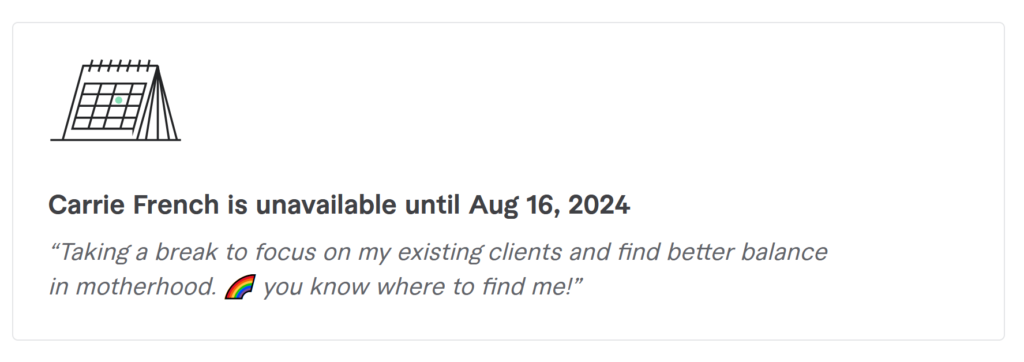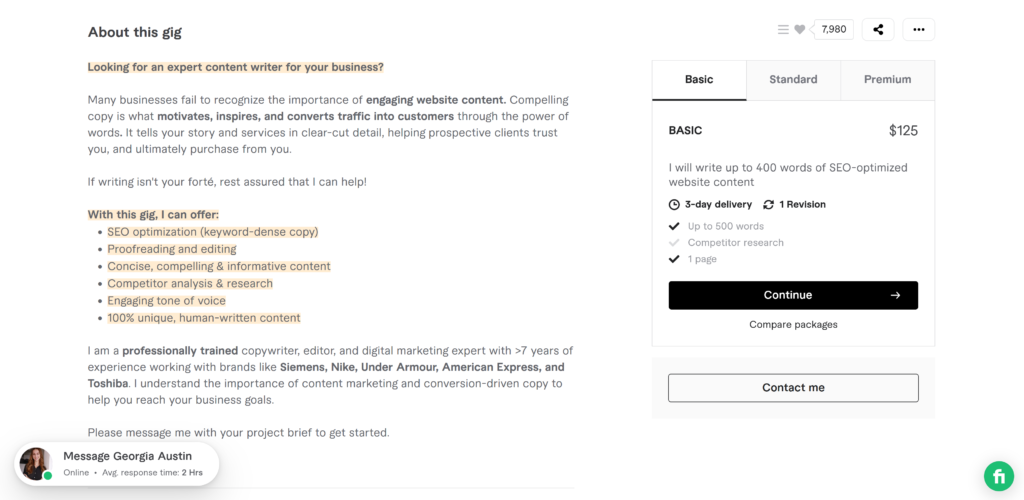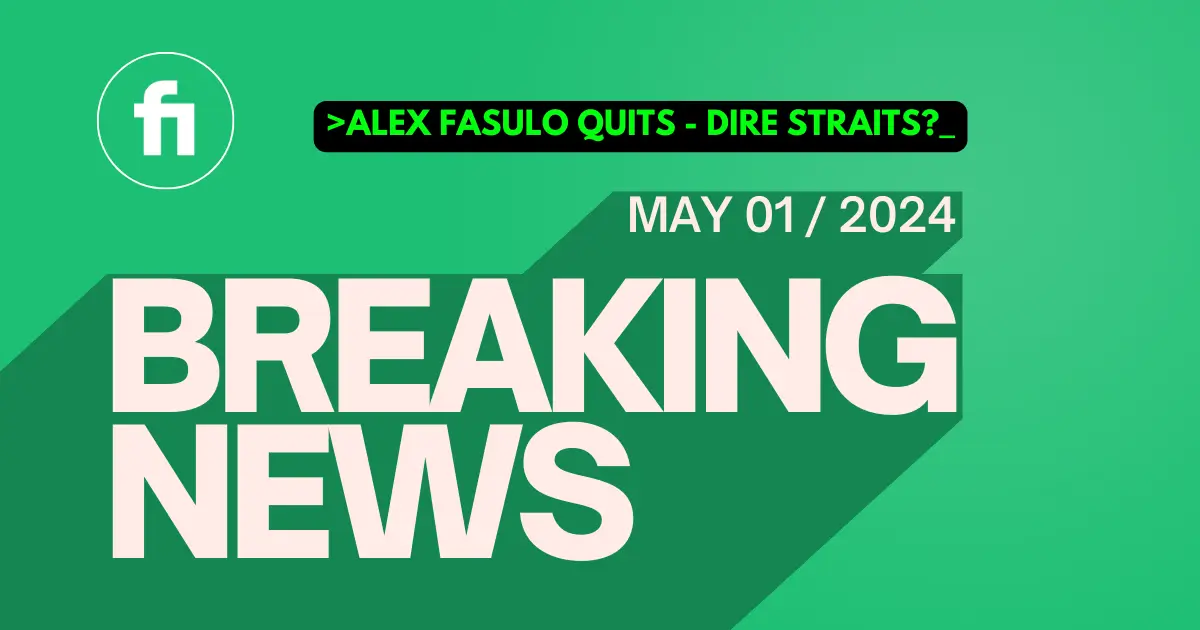
Fasulo follows in the footsteps of Levi Newman ($1.4 million) as another millionaire departure from the freelance marketplace. Is this a trend – and why is Fiverr losing sellers who have done exceptionally well on the platform?
“I think of Fiverr as training wheels on a freelancer”
With this bombshell in a shock video released on April 29, Alex Fasulo revealed to her 99,300 followers that she was quitting Fiverr for good. In the video, she criticized multiple aspects of Fiverr, including:
- The static 20% commission rate regardless of the project price
- The lack of support for experienced sellers, particularly during disputes
- The heavy algorithmic penalization of sellers for taking time off
Fasulo added that she could only recommend Fiverr to beginning freelancers due to its large user base and ease of finding work, before recommending that they move onto social media and other platforms for better work opportunities with a lower – or no – commission.
Despite Fasulo listing some common complaints as reasons for leaving Fiverr, she did not give her viewers specific details of any situation that made her quit.
The announcement is something of a formality, as Fasulo was out of office and unavailable for work on the marketplace throughout 2023. Her Fiverr profile also shows that she has been inactive as a buyer for a year. It is these purchases, primarily from sellers in developing countries like India, Pakistan, and Bangladesh, that hint at what made her a controversial figure in the past few years.
Fasulo’s Controversial Fiverr Career Is Finally Finished
In 2021, Medium author Daniel Rosehill wrote Why I Have Suspicions About Alex Fasulo’s Claimed Fiverr Income (Or Methods). This article would dog her final three years on Fiverr. Rosehill’s research raised several concerns:
- Fasulo’s claimed earnings from low-paying gigs
- The volume and scale needed to attain those earnings
- The lack of transparency over outsourcing
- Fasulo’s course selling as a potential primary source of income
- The lack of critical media and skewed public perception
The article was a damning one that got a lot of attention across the wider internet and on TV. Fasulo would later make a TikTok admitting that she worked with a team of writers, something that she had not disclosed either to her buyers on Fiverr or in CNBC interviews.
Fiverr stayed quiet as these these allegations made their way around the online world. Although Fasulo admitted that she was dropservicing, this didn’t mean that she wasn’t prepared to protect her reputation as a Fiverr seller who was delivering her own content to clients.
Fasulo’s Legal Drama with Carrie French
In 2022, just a year after Rosehill’s expose, former Fiverr Pro seller and YouTuber Carrie French accused Fasulo of being a scam artist who was, essentially, deceiving her buyers with dropservicing.
If you’re not familiar with the term, dropservicing is another term for outsourcing or service arbitrage. A typical model sees a company sell services like graphic design to their clients, outsourcing their work to freelancers on platforms like Fiverr and Upwork.
The claims were nothing new to anyone who had read Rosehill’s Medium article. A short time later, French revealed that her previous video (above) had resulted in a cease and desist with the threat of a defamation lawsuit. French estimated that legal fees alone would amount to anywhere between $50,000 to $100,000.
She deleted the video, but has since republished it (it’s the video above).
Whatever position you take on dropservicing, it is clear that Fasulo was prepared to protect her Fiverr business model and shut down any criticism that might threaten it.
How many other people might she have done this to who ultimately stayed quiet?
French has since left Fiverr after taking time off for maternity leave. During this time, she lost her Top-Rated Seller status, which made her re-evaluate the time she spent on Fiverr. Somewhat ironically, this underlines one of the points that Fasulo made in her quitting video: Fiverr simply doesn’t allow for time off.

It’s another major issue at the heart of Fiverr in 2024 that ultimately ties into why Fasulo believes the platform is only good for beginner freelancers.
It may also be the real reason behind her departure.
Fasulo Isn’t The Only Fiverr Millionaire Quitting
In February, Levi Newman made an explosive post on the Fiverr Forum, in which he threatened to quit Fiverr. This provoked Fiverr into a crisis meeting with the seller, who came out unconvinced. He is still on schedule to quit on June 1st.
Newman made $1.4 million on the platform writing Amazon product descriptions. He cites the same set of reasons that Fasulo does. Combined, these sellers have made $3 million on the platform and have the potential to earn so much more.
So why leave? We understand Newman’s reasons. Fasulo’s reasons are a little more opaque, but they do tap into sellers’ wider discontent with the platform in 2024.
Smaller Sellers Are Also Abandoning the Platform
On any given day on r/Fiverr or the Fiverr Forum, sellers who are tired of Fiverr are posting of their plans to leave the platform, or at the very least, to find a less exhausting and punitive platform to work on.
Their reasons mirror those of Fasulo and Newman. While sellers leaving Fiverr is nothing new, there has been a noticeable increase in discontent since the introduction of the new levels and rating system in February.
- Fiverr has the highest commission in the industry (20%)
- Fiverr’s support is slow and often unhelpful in dispute
- Fiverr places enormous pressure on sellers to perform
- Fiverr is increasingly monetizing features that should be basic
- Fiverr’s pool of buyers is shrinking and there is less work
- Fiverr is failing to listen to sellers and take criticisms on board
Is Fiverr facing an exodus of talent? It’s hard to tell, as the company does not publish the exact number of sellers on the platform. A lot of so-called “veteran sellers” are leaving, yet new sellers are often frustrated by approval processes that lock them out of selling.
I believe that seller numbers are in decline with buyer numbers, but this is only speculation. Fiverr may have an infinite amount of new sellers to plug the gaps – but real talent is a much more finite resource.
$2 Million Seller Georgia Austin Is Still On Fiverr

Not all millionaires are ready to flee Fiverr just yet.
Georgia Austin is a writer on Fiverr who has made over $2 million on the platform. She is also the CEO of a hybrid content company called Wordbrew (formerly Wizio). Like Fasulo, her profile on Fiverr celebrates how she writes and delivers all the work herself. On Business Insider, she admits that she turned to drop servicing like Fasulo, hiring 100 writers to meet the demands of $20,000+ months.
She is a smart businesswoman who has discovered that Fiverr is a great launchpad for talented people. There’s little to fault with her business strategy – other than question marks over who, or what, creates the content she delivers on Fiverr.

Wordbrew describes itself as a business that “combines AI’s speed and automation with human insight and creativity. Blended intelligence brings together the best of both worlds“.
In other words, a team of “subject experts” will fact-check articles and spruce up the AI writing.
However, the Wordbrew site may be an illusion. Five months into 2024, the copyright of the website still points to 2023, suggesting that this site is not as active as it could be.
The site does point toward’s Austin’s Fiverr career, which provides the origin story for the company.
Austin also runs Wizard of Content, a copywriting agency which appears to be defunct, despite a mention in a paid feature by a showbiz correspondent in the UK’s Daily Express tabloid newspaper; the sole comment moans about the appearance of another advert. On Fiverr, she typically has over 10 orders in her queue at any given time; when I checked today, she had over 30 across multiple gigs. With gigs starting at $125 with a 3-day delivery, it’s clear that Fiverr remains a good source of income for the Top-Rated Seller – but is it a workload that one writer can sustain alone?
Hybrid content writing is exactly the kind of complex AI service that Fiverr wants to promote on their platform. Yet Austin does not promote this service (there is very little demand in the Writing and Translation category for AI work). She promotes her own writing in her gig descriptions. A buyer might easily think that she does all the work herself.
Yet elsewhere, Austin makes no bones about her dropservicing and hybrid content services. Is Austin using her own company to deliver work on Fiverr? We don’t know. However, some of her buyers have left reviews suggesting that she used AI to create and deliver the content when they expected human writing.
Fasulo has also promoted Austin on Medium, and there are undeniable similarities between the two writers’ stories, although Austin has avoided controversy so far, learning from Fasulo’s missteps. Austin promotes Wordbrew extensively on LinkedIn, but chooses not to disclose whether or not she uses AI on Fiverr. It’s a new kind of transparency – one that rewards buyers who do their due diligence.
In the end, we can only speculate about Austin’s Fiverr work.
Fiverr’s non-disclosure policy ensures that a question mark hangs over everyone’s work. All writers on Fiverr have faced accusations from buyers, true or not. The rise of artificial intelligence is impacting the gig economy and it is not all positive, especially when one bad review has the potential to ruin a seller’s visibility and income for months.
Fiverr’s marketplace economy absolutely depends on trust on to thrive in the long-term. It’s the reason Fiverr’s Community Standards request that users practice honesty and transparency – but not with AI.
Why is that? One potential lies in what is known as AI washing.
Is Fiverr Stock Turning Into AI Stock?
AI washing is the practice of exaggerating or misrepresenting the true capabilities of their AI products or services. The purpose is simple: to capitalize on the hype surrounding AI at the moment. This isn’t exclusively a Fiverr problem: it’s a bubble problem:
A few days ago, The Motley Fool published an article recommending Fiverr as a top AI stock to buy. The Motley Fool (and the article’s author) hold positions In Fiverr International, so this position is not as neutral as it could be.
This is something that I can overlook: finance writers cheering about stock they own is nothing new. However, as a Fiverr seller, I found this analysis poor. Not because Fiverr stock took a nosedive shortly after the introduction of new seller evaluation systems in February – but because of the apparent lack of knowledge on how AI in Fiverr’s marketplace actually operates.
Take this paragraph:
“But what of the threat of OpenAI’s ChatGPT and other generative AI tools? Yes, Fiverr may lose a few freelance connections as penny-pinching clients look for ways to avoid paying for talent. But those cost-cutters will soon find out that it takes human brains to make the most of these tempting AI tools. As the old truism in the computing world states: Garbage in, garbage out.”
Anders Bylund writing for The Motley Fool (emphasis mine)
Garbage in, garbage out?
That’s definitely the dream. Unfortunately, for many buyers on the platform now, it is a truism that applies perfectly to Fiverr. For all the marketplace’s talk of complex AI services, it has failed on this front badly due to its own policies.
Fiverr has a non-disclosure AI policy for sellers. This means that sellers can deliver AI work as their own work. The cost-cutters that The Motley Fool fondly imagines getting fantastic AI work aren’t looking for AI work – but they are getting it anyway, often at inflated prices.
If that wasn’t bad enough, some buyers are paying $400 for AI written articles:

It’s one thing to get a badly-written AI article for $5, quite another for $400 – and not be able to prove anything and get your money back.
I will go so far as to call it fraud.
Fiverr lost 200,000 buyers over 2023. It is not Fiverr’s genuine AI sellers selling complex AI services and clearly disclosing when they use AI that are the issue here. It is dishonest sellers charging hundreds of dollars for simple, unedited AI content with the blessing of Fiverr’s current AI policies.
Fiverr knows this is happening and does nothing, at least publicly. On the Fiverr Forum, it ignores users who point out what is happening.
How many of these sellers are on the marketplace? Nobody, not even Fiverr knows. I believe this is a big problem and one that is affecting buyer confidence in the marketplace. If Fiverr makes one good decision this year, it should be to follow other tech companies like Medium and Amazon by requiring disclosure from sellers who use AI to deliver the final product.
The company will release its Q1 2024 report on May 9th. It may be interesting reading. If buyer numbers continue to decline, it is only a matter of time before serious sellers start leaving the platform too. Fiverr wants to go upmarket – but if its marketplace is full of deceptive and opportunistic AI freelancers, how can this dream possibly work?
It’s a question I’ve asked staff several times, only to be stonewalled by silence. What is clear is that Fiverr is hoping to overcome its floundering stock with AI.
But what happens when the AI bubble pops? Fiverr is not an AI company. It is a freelance marketplace that is leveraging the current AI trend to prop up very uninspiring stock performance following its coronavirus high. It’s hard to see how this is sustainable when the platform is rife with AI scams as a result of its own policies.
Fiverr Is Turning Towards Sellers to Boost Its Coffers
Fiverr’s is also antagonizing its top sellers on other fronts. When Seller Plus launched, it offered an exclusive deal to a small group of sellers, many of whom already had a success manager. I was one of them.
The deal was simple: Fiverr was launching an exclusive, subscription-only service and the first 200 sellers would enjoy a discount price of $19 until cancellation. Like many others, I assumed this was a lifetime deal and that I could trust Fiverr to keep its word. When Seller Plus Premium was introduced, we were upgraded with it.
It did not. From today, I will now need to pay $39 regardless as part of a “price alignment” for the Seller Plus program. That’s a 100% price increase, and a severe dent in my trust. Sellers who joined later on another drive with a $29 price lock are also angry about the 50% price increase.
This news was delivered on April Fool’s day, which many sellers initially took for a bad joke. Like the Valentine’s Day launch of the new levels and ratings system, there is a feeling among the community that Fiverr doesn’t care – and may even be trolling.
I have 2 more weeks to decide whether I am cancelling or not – and I believe I will cancel. On the Seller Plus management page, nothing has changed. This is a screenshot from today, May 1st:

When I asked my Success Manager and Fiverr Customer Support about this, I was told it was a “visual discrepancy”. It has not been fixed in the two weeks since I told them about the issue.
It’s just not good enough.
Seller Plus is now available to virtually anyone. This is not a bad thing, but it is a far cry from what it was intended to be as it launched. I believe it reflects the behavior of a company with unhealthy finances.
As Fiverr continues to annoy and frustrate its buying and selling communities, some are starting to question Fiverr’s leadership. After all, these decisions are coming from somewhere – and the obvious place to look at is the top. There may also be answers in Fiverr’s Q1 2024 reporting.
Fiverr Is Probably Better Without Fasulo – But Not Much
Fasulo may have been a controversial seller with some dubious business practices on the platform, but her departure comes at a time when many worrying trends are emerging. Fasulo spent most of 2023 encouraging her followers to use AI to make money on Fiverr – and never truly pushed them to disclose.
We also don’t know Fasulo’s personal reasons for leaving Fiverr. Despite promoting the platform, she simply had not been active on it for a year. Why leave, and why now? It may be a simple refocusing of her business – or it may be something more.
She absolutely could have made more money on the platform – but maybe the publicity was too much. But when an up-and-coming Pro challenged her, someone who I believe could also have been a Fiverr millionaire, she chose legal threats. Either way, both are now no longer selling on Fiverr.
These two women, along with Newman, are all good businesspeople who have obvious talent. They are also talent that Fiverr is losing, for better or worse. How many more extraordinary talents are leaving Fiverr quietly, and can Fiverr replace their skills and talent with AI?
I don’t think so.
But Fiverr does. Fiverr is not giving up on its AI dream easily. Only time will tell whether it is making the right call, but for now, buyers and sellers are leaving, and signups appear to be dwindling.
Fasulo didn’t encourage people to leave the platform with her, but she spent a lot of time discouraging working on Fiverr beyond the “startup” phrase of their freelance empire Whatever you may think of Fasulo, there are many who listen to her. How many quiet Georgia Austins does he platform have – and does their income help persuade Fiverr to keep an AI policy that harms the marketplace’s integrity?
Whether they are using AI or not, the suspicion is there.
I still believe Fiverr is a place of great opportunity where people can do very well. However, it is troubling to see the direction it is taking at the moment. AI is in a bubble – it is not the answer to Fiverr’s problems and is causing it more problems. But when will the company realize this?
I’ll stick with Fiverr for now. But I fear that things will get worse before they get better, if they ever do.



